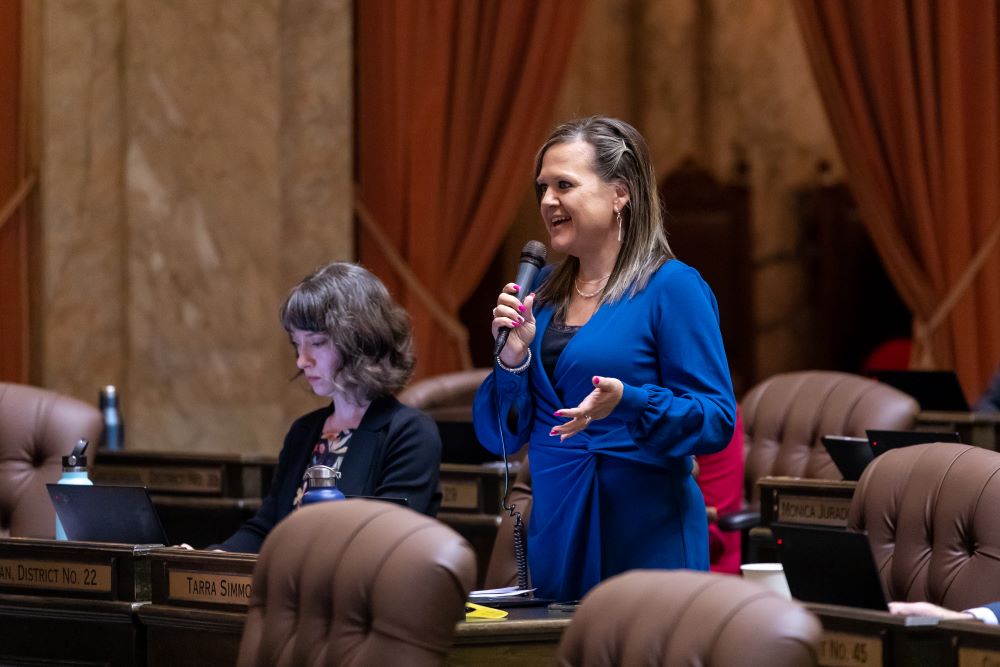Dear Friends and Neighbors,
The last week of the legislative session is upon us! The Legislature adjourns “Sine Die” (without end) this Sunday. Last week, we passed the “Opposite House” cutoff. Bills that had not passed both chambers by last Wednesday are now dead. This week we are focusing on reconciling differences in the House and Senate versions of bills through concurrences and conferences. We will also pass our state’s two year operating, capital, and transportation budgets.

Increased Funding for Washington State Ferries

We all saw the impacts of underfunding our ferry system this week. While I am happy that everyone on the Walla Walla got off the boat safely and no one was hurt, it highlights how old our current ferry fleet is. We need immediate investments in new ferries, new crew members for ferries, and maintenance staff and facilities. This year’s transportation budget takes these concerns seriously and invests over $1.25 billion in our state’s ferry system. Those investments include:
New Vessels
- Funding to start the construction of five new hybrid-electric vessels over the next ten years.
- Funding to convert three ferries to hybrid-electric.
Maintenance
- Making a significant investment in Washington State Ferries’ (WSF) Eagle Harbor Maintenance Facility(Bainbridge Island) to keep ferries on the water.
Workforce Initiatives
- Funding the able-bodied sailor (AB) to Mate Pathway This will improve the process for unlicensed deckhands to receive their mate’s license.
- Scholarships for mate candidates and fund necessary education for successful licensing.
- Funding new employee training, pay for TWIC cards, and housing for workforce training.
- Creating a partnership between WSF and Seattle Maritime Academy to develop a joint training and recruitment plan that centers WSF’s training and development needs and focuses on concrete action to recruit diverse students for the ferry workforce and maritime training.
- Supporting the pre-apprenticeship support services program (PASS) to ensure WSF staff are representative of the communities they serve. This program will provide technical education, sea time, employment readiness skills, as well as supportive services to aid underserved and underrepresented individuals to gain meaningful, family-wage jobs with WSF.
Legal Financial Obligations
This week the House concurred with Senate amendments and sent HB 1169, my bill to eliminate mandatory Legal Financial Obligations (LFOs) for indigent and juvenile defendants, to the Governor’s desk. This will free up county clerks from spending dollars to chase dimes, ensure that crime victim’s programs are adequately funded, and give formerly incarcerated people who are unable to pay their LFOs a second chance. A person cannot vacate their conviction until all of their LFOs are paid. This creates a debt trap where a person cannot pay off their LFOs because they don’t have a good enough job, and they can’t get a good enough job because they can’t pay off their LFOs. This drives people deeper into poverty and often back into crime. This bill allows a judge to retroactively waive a person’s DNA fee if a person is unable to pay. This will allow thousands of Washingtonians to vacate their convictions and move on with their lives.
This bill is the third in a series of bills over the last eight years to reform the LFO system. When I first came to Olympia in 2015 to testify about LFOs I was 20 months out of prison and struggling to pay mine. At that time, the state imposed a 12% interest on LFOs and the amount I owed had increased dramatically while I was incarcerated. I testified about how the state was garnishing my $9.19 an-hour paycheck from Burger King despite not owing any victim restitution. I shared how committed I was to living a lawful life and never leaving my children again, and how hard it was to provide for my children while living in severe poverty. This bill is the result of years of hard work by countless advocates. Watch my floor speech on concurrence below to learn why this bill is a win-win-win for Washington.
Addressing Washington’s nursing crisis
According to the Washington Center for Nursing, an average of 2,600 people graduated as registered nurses from 2014-2019, but close to the same number are expected to retire through 2029. In other words, we are replacing the nurses in the workforce, not growing the workforce.
While adding 220 nursing education slots last year is a good start, it doesn’t meet current needs. So this session we passed a package of bills to retain the existing workforce, attract new nurses to the state, and graduate new nurses:
HB 1255: improves a Department of Health monitoring program for nurses struggling with substance use disorder, allowing experienced nurses to stay in the field.
SB 5236: strengthens accountability to hospital staffing plans. If hospitals fall below 80 percent compliance with their staffing plans, they will be assigned corrective action plans.
The bill also expands meal and rest break laws to include all frontline staff, closes loopholes to make mandatory overtime laws fully enforceable, and ensures hospitals follow the law.
SB 5499: enters Washington into the Nurse Licensure Compact, an agreement between 37 states that allows for a multistate nursing license. This means a nurse licensed in one of the participating states can work as a nurse in any of the other 36.
SB 5582: reduces barriers and expands educational opportunities to increase the supply of nurses in Washington by, among other things, requiring the development of an online Licensed Practical Nurse program; creating a marketing plan to advertise available nurse training opportunities and jobs in Washington; and creating pilot programs for high school students and working caregivers.
Thank you for reading my legislative newsletter. I will continue updating you periodically throughout the legislative session.
Sincerely,
![]()
Rep. Tarra Simmons
